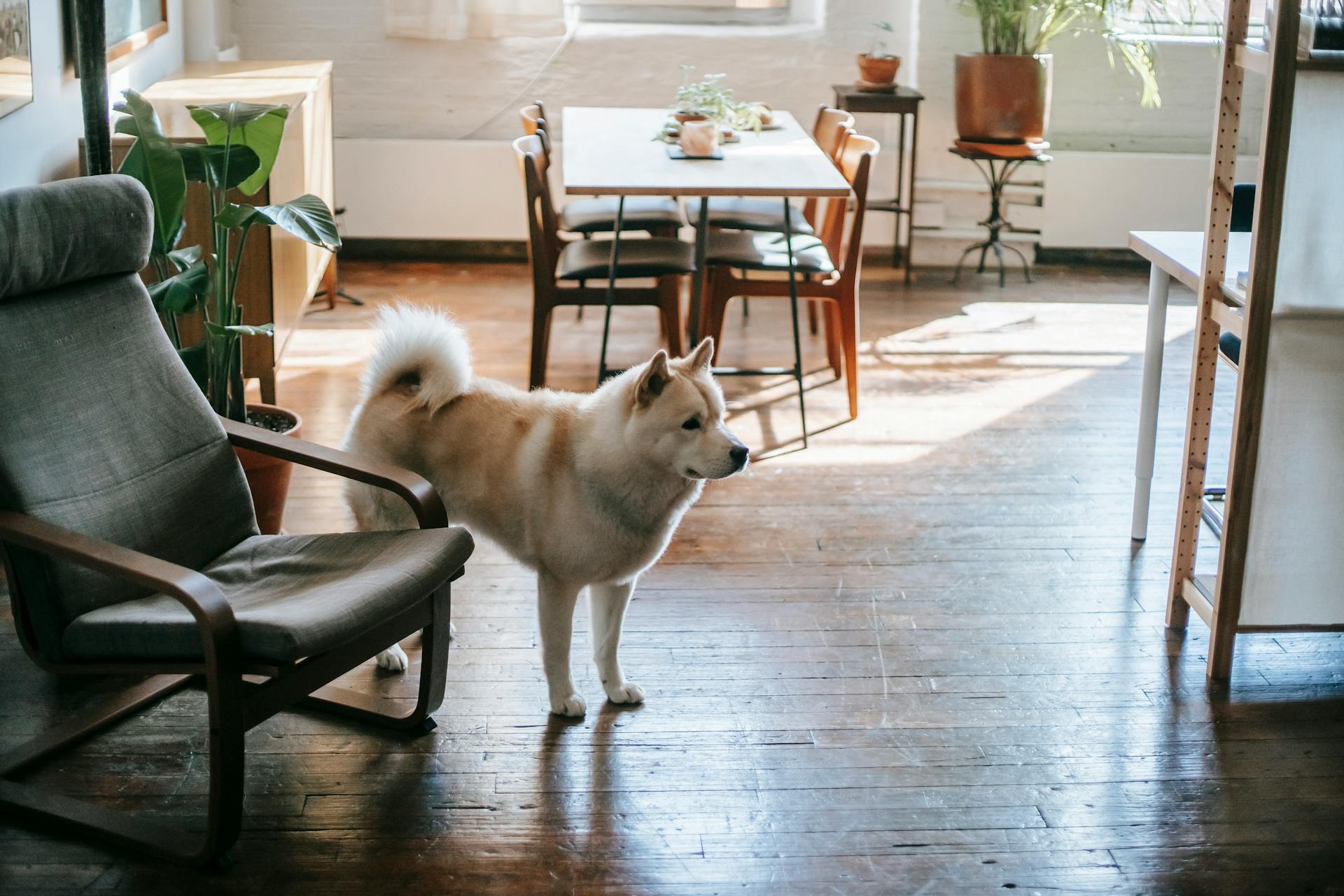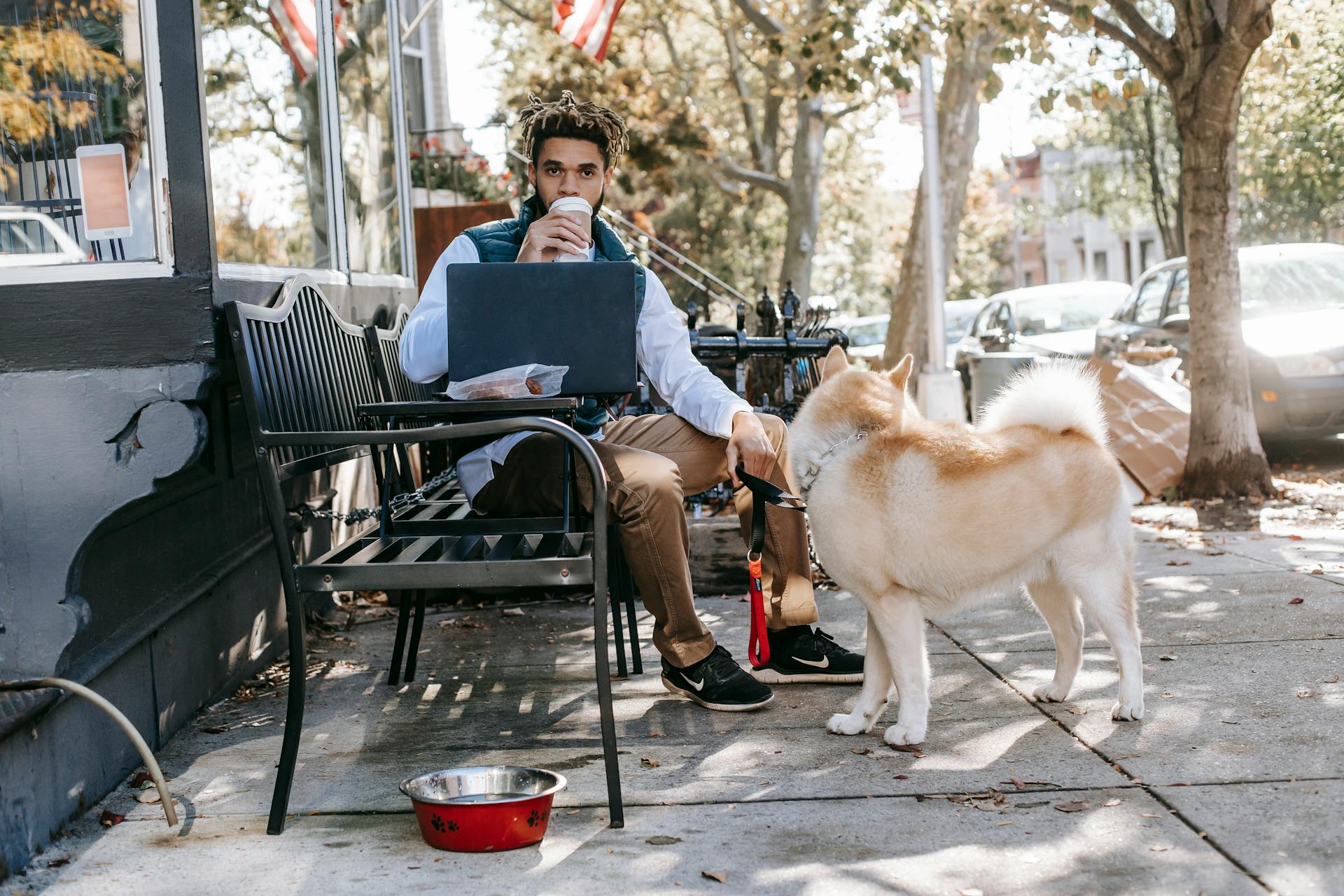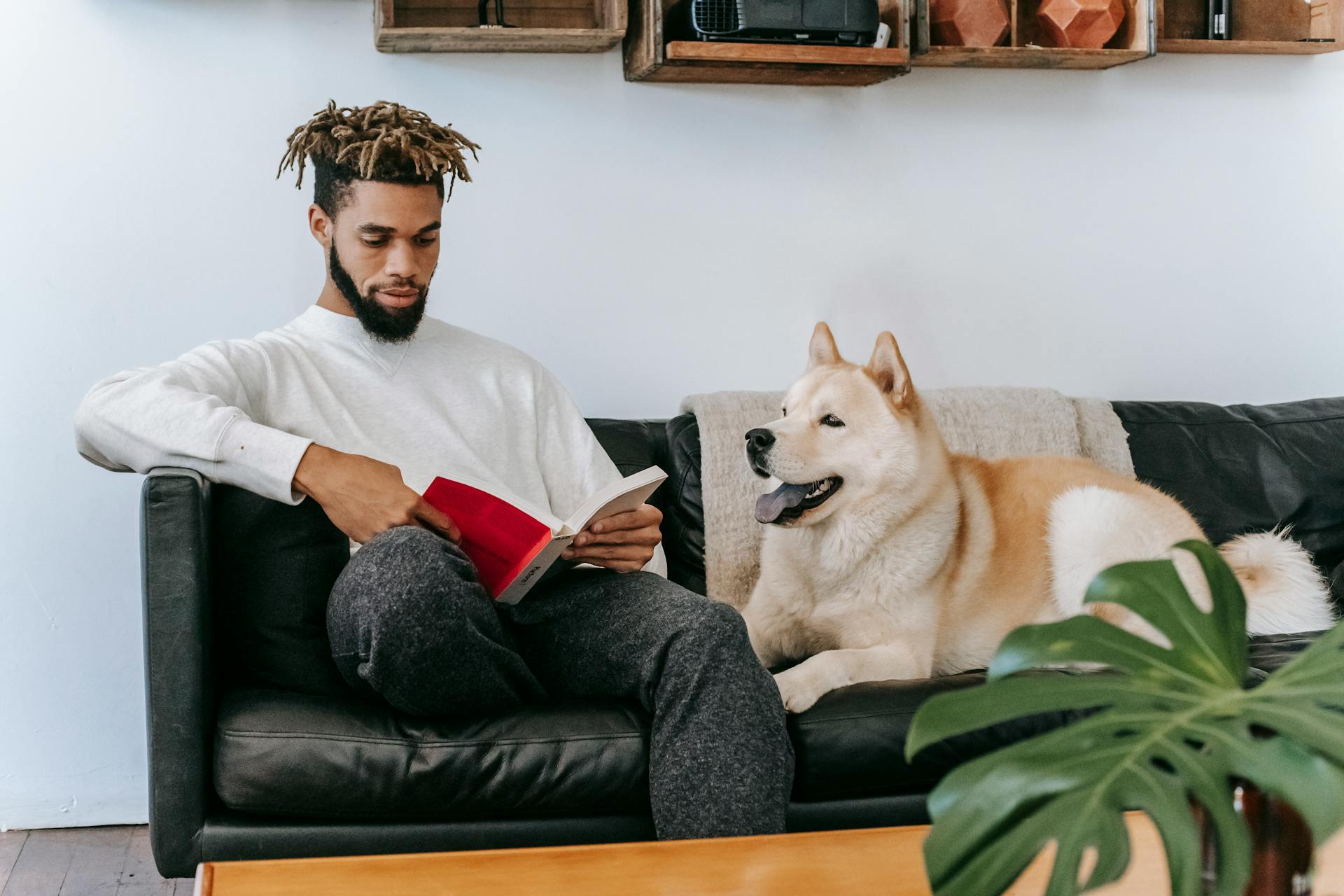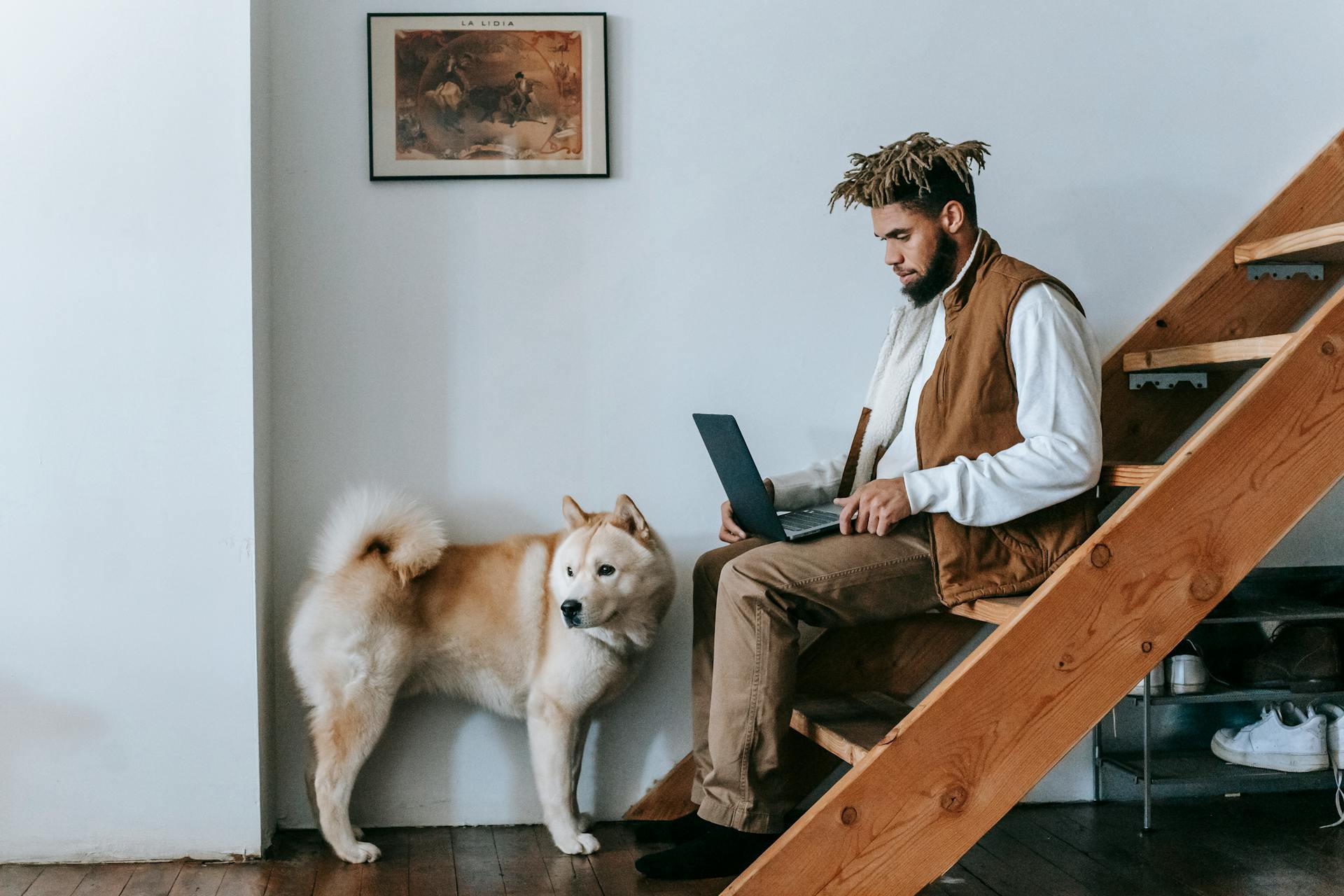
Akitas are often misunderstood as being aggressive or unsuitable for families with kids, but the truth is, they can make wonderful family pets if you're willing to put in the work.
In fact, Akitas are known for their loyalty and protective instincts, which can be a great asset in a family setting. They'll often form strong bonds with their family members, especially children.
However, Akitas do require early socialization and training to ensure they're comfortable around kids. This is especially important during their first few months of life.
One thing to keep in mind is that Akitas are large dogs, and they can be clumsy, so they may accidentally knock over a child or two.
A fresh viewpoint: German Shorthaired Pointer Family Dog
Are Akitas Good with Kids?
Akitas can make excellent family pets, but they're not the best fit for every family. If raised properly, with proper training and early socialization, Akitas can be good family dogs.
However, Akitas may not be the best breed for families with younger kids, as they can be too much for them to handle. They require strong leadership and firm handling, and if they don't respect or obey their owner, they're unlikely to respect or obey their children.
Discover more: Are Boxer Dogs Good Family Dogs
Akitas are large-sized dogs and can be powerful, so it's essential to consider the age of your children before bringing an Akita home. They may not like the boisterous energy of young children, and their calm and reserved nature may conflict with most kids.
Here are some key factors to consider when deciding if an Akita is right for your family:
- Your Akita requires strong leadership and firm handling.
- Akitas may become aggressive if they see your child as a threat.
- Akitas are large-sized dogs and can harm your young child accidentally.
- Akitas tend to shed a lot, which could be a problem if your child is allergic.
Friendly Around Kids?
Akitas can make great family pets, but it's essential to consider their temperament and needs. If raised properly, with proper training and early socialization, Akitas can be good family dogs.
However, Akitas may not be the best breed for families with younger kids. They tend to be protective of their family, but can find the energy and noise of young children overwhelming. This can lead to aggression if not properly socialized and trained.
Akitas who grow up around kids from an early age tend to be more tolerant and even protective of them. But if your Akita hasn't been socialized to children, it's best to keep them separate.
Curious to learn more? Check out: Rhodesian Ridgeback Good Family Dog
Here are some key factors to consider when deciding if an Akita is right for your family:
- Age of children: Akitas may do better in families with older children who have been taught to behave around pets.
- Training and socialization: Proper training and early socialization are crucial for an Akita's behavior around children.
- Energy levels: Akitas have high energy levels and require regular exercise to prevent boredom and destructive behavior.
Remember, every dog is an individual, and it's essential to research and understand the breed's needs and temperament before bringing an Akita into your home.
Having Kids After Marriage
Having kids after marriage can be a big change for your household, especially if you already have an adult Akita. Many people give up their dogs or put them down because they now have a baby in the household.
It's very difficult to know how your Akita will react to a new baby, even if you've had them around other children. Dogs are all about familiarity and routine, and Akitas are no exception.
If you're bringing a baby into your adult Akita's life, do it very slowly and in a controlled manner. It may not be a bad idea to do it under professional supervision the first few times they interact with one another.
Training and Socialization
Training an Akita to be good with kids requires patience, consistency, and positive reinforcement. Akitas are highly intelligent, but also stubborn, so they need to be trained with a firm but gentle hand.
To start, socialization is key. Expose your Akita to a wide variety of people, including kids and adults, and different environments. This will help them become well-mannered and calm in the presence of children. Start socialization as young as possible, ideally before 16 weeks.Get your puppy to interact with other dogs, people, and environments.
Akitas are also protective of their food, so teach your kids not to touch their food bowl or snatch their food while they're eating. Also, be gentle when interacting with your Akita, as they have sensitive ears and tails.
Here's an interesting read: What Dog Food Is Best for a Pitbull
Dangerous Around Kids?
Akitas can be a challenge to raise due to their complex personality, which is a combination of their guarding instinct, reserved nature, and powerful build. This makes them very good guard dogs, but also potentially dangerous around kids if not controlled effectively via regular and effective training.
Akitas are naturally protective of their loved ones and may attack if they perceive someone as a threat, even if it's a child. They don't show signs of being upset, so you may not be able to intervene in time to control them.
It's essential to remember that Akitas are large dogs and can accidentally knock over kids. They're also possessive about their things, like food and toys, so kids should be taught not to take things away from them, even if they're well-trained.
If your Akita doesn't respect or obey you, it's likely they won't respect or obey your child either. This is a crucial factor to consider when bringing an Akita into a home with kids.
Here are some key things to consider when introducing an Akita to kids:
* Akitas require strong leadership and firm handling, so be prepared to be the pack leader and take charge.Akitas can become aggressive if they see kids as a threat, so ensure you have measures in place for their safety.Akitas are large and powerful, so consider your kids' age before bringing one home.Akitas may not like the boisterous energy of kids, so be aware of this potential conflict.Akitas' temperaments can be unpredictable, especially with puppies, so consider getting an older dog for a more stable personality.
Discover more: Akitas Good Service Dogs
Socialising and Home Environment
Akitas are highly intelligent dogs, but they can be stubborn, making training a challenge. They respond well to a firm but positive hand during training.
To socialize your Akita, start as young as possible, ideally before 16 weeks. This will help them become well-mannered around kids. Socialization classes and exposing them to lots of friendly humans early on in life can lessen the chance they'll become extremely wary of strangers.
Akitas require strong leadership and firm handling, so it's essential to be the pack leader and take charge. If your pet sees your child as a threat, they can become aggressive, so it's crucial to have measures in place for both your kids and your Akita's safety.
In general, Akitas are calm and reserved dogs, but they may not like the boisterous energy of young children. Their independent nature can make them difficult to train, so it's recommended to train them while they're very young.
Here are some essential tips for socializing your Akita:
- Get your puppy to interact with not just other dogs, but a wide variety of people (kids and adults) and a variety of environments as well (the car, the store, the park, etc…)
- Practice taking away your puppy's food and toys while they're using them to prevent any resource guarding
- Teach your kids to treat all animals with respect, including your Akita, and make sure they understand that dogs can be dangerous and how they would like to be treated
To create a harmonious home environment, it's essential to teach your kids how to behave around your Akita. This includes not reaching into their food bowl, not waking them up while they're sleeping, and not pulling their tail.
Raising Akitas with Kids
Teaching your kids to behave around your Akita is crucial for a harmonious household. Your kids should learn not to reach into your pet's food bowl or snatch his food while he's eating, as this can be extremely serious.
Akitas are protective of their food, and your kids need to understand this. When your pet is sleeping, your kids should never wake him up, poke him, or harass him, as this can make your Akita hostile to your child.
Shouting or yelling at your Akita can make him aggressive, so it's essential to teach your kids to handle the situation calmly. Your Akita's tail is as sensitive as his ears, so your kids should never pull his tail, as this can traumatize him and make him hostile towards your kids.
Related reading: What Food Is Good for Dogs Skin and Coat
It's also vital to teach your child to handle your pet gently and to treat all animals with respect, including your Akita. Make sure your kids understand that dogs can be dangerous and how they would like to be treated.
To ensure a smooth transition, consider the age of your Akita when bringing home a new baby. If you have an older Akita, you can socialize him and train him to get along with your kids. If you have a puppy, you'll need to wait until he's fully grown to understand his temperament.
Akitas are large-sized dogs and can harm your young child accidentally, so you must consider your kids' age before deciding to bring home an Akita. In general, Akitas are calm and reserved dogs and may not like the boisterous energy of your children.
Here's a list of things to teach your kids to avoid:
- Reaching into your pet's food bowl or snatching his food while he's eating.
- Waking your pet up, poking him, or harassing him while he's sleeping.
- Shouting or yelling at your Akita.
- Pulling your Akita's tail.
- Pulling, hitting, or climbing on top of your pet.
By teaching your kids to behave around your Akita and considering the age of your dog when bringing home a new baby, you can create a harmonious and safe household for everyone.
Ideal Home and Family
If you're considering bringing an Akita into your home with kids, it's essential to think about the type of household you have. Akitas are large, powerful dogs that require strong leadership and firm handling. They may not be the best fit for families with younger kids, as they can become aggressive if they don't respect or obey their owners.
Akitas are also naturally protective of their pack, which can sometimes manifest as intervening in play-fights between children. They may also be suspicious of other dogs or pets, making them better suited to a one-pet household.
If you do decide to bring an Akita home with kids, it's crucial to consider their age. Akitas are not the best match for families with small children, as they can accidentally harm them. Older children, on the other hand, can learn how to interact with Akitas in a way that's safe and respectful.
Here are some key factors to consider when deciding if an Akita is right for your family:
Ultimately, with the right approach and care, Akitas can thrive in homes with kids. However, it's essential to be aware of their needs and characteristics to ensure a harmonious household.
Breed Characteristics and Breeding
Akitas are known for their loyalty, which makes them excellent family protectors. They form strong bonds with their owners and are incredibly devoted.
Akitas are highly intelligent, which makes them quick learners. They excel at various activities and can be trained for obedience, tracking, and even therapy work.
However, Akitas have a natural tendency towards dominance and can be aggressive if not properly socialized and trained from an early age. This can make them less ideal for first-time dog owners or families with young children.
Akitas require regular exercise to prevent boredom and destructive behavior. A daily walk and a fenced yard are essential for a happy and well-adjusted Akita.
Their high energy levels and dominant nature mean they need consistent training and socialization from an early age to ensure they grow into well-behaved companions.
Characteristics
Akitas are known for their loyalty, weighing between 70-130 pounds, with males typically being heavier than females. They're extremely loyal and fiercely protective of their family.
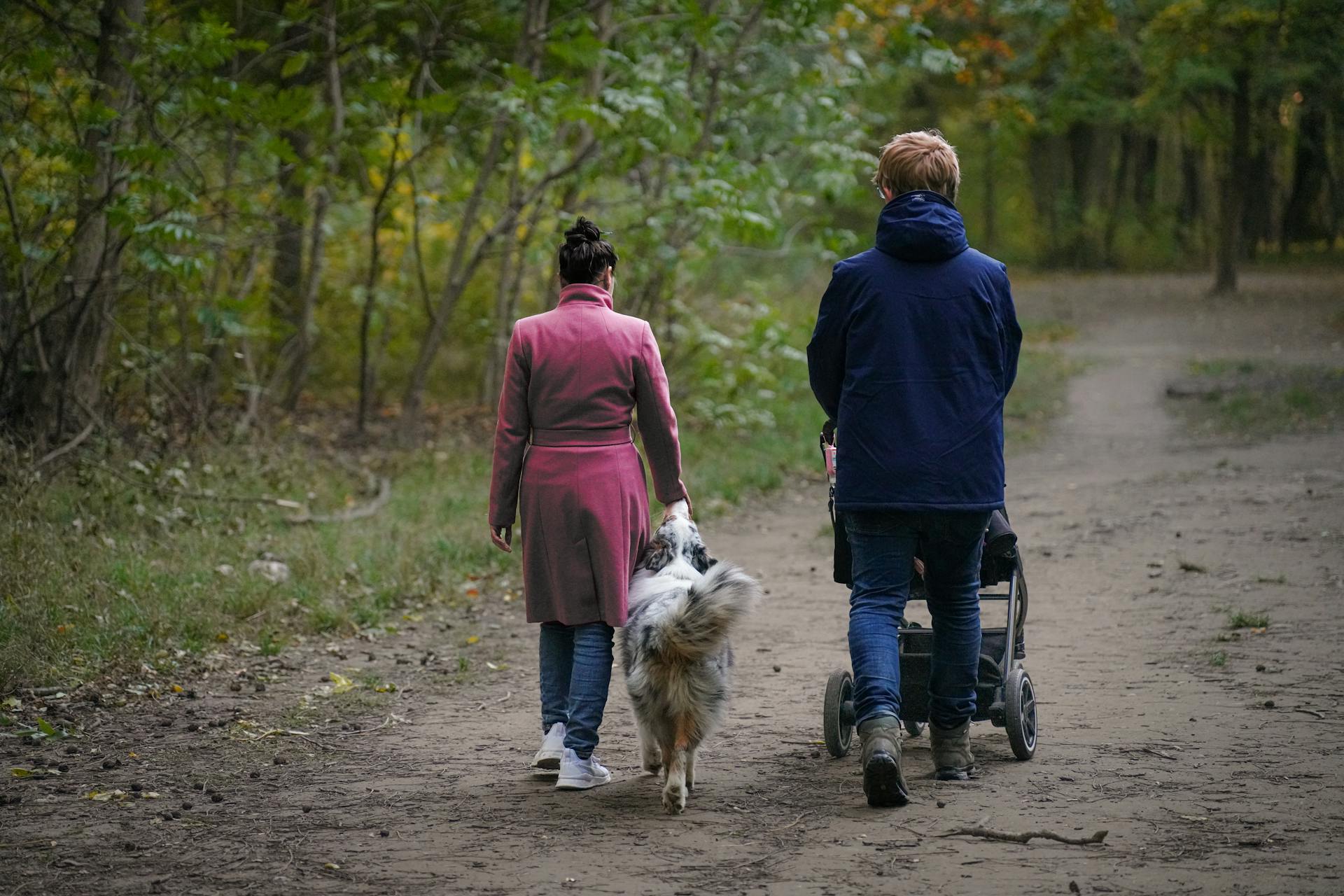
Their intelligence is undeniable, making them quick learners and excel at various activities. They're highly intelligent, which makes them respond well to obedience training.
Akitas are relatively easy to groom, requiring only a weekly brush to prevent matting and reduce shedding. They do shed throughout the year, with heavy shedding occurring twice annually.
Their energy levels are moderate, requiring around 30 minutes to 1 hour of exercise per day to keep them happy and healthy. They're not the most active breed, but they do need regular physical activity.
Akitas are known for their stubborn streak, requiring an experienced pet parent handler and early training and socialization during puppyhood. They can be headstrong, but with proper training, they can be well-behaved companions.
Here's a summary of their characteristics:
Akitas are known to be quiet, earning them the nickname "The Silent Hunter". They tend to only bark when necessary, making them a great choice for families who value a peaceful living environment.
Importance of a Good Breeder
Working with an ethical breeder is crucial when searching for a new furry family member. A good breeder will only place dogs in homes that will be a good fit.
If you're shopping for an Akita puppy in the US, start by checking the Akita Club of America's website. If a breeder isn't registered with the ACA, it's best to avoid them.
Good breeders will have thorough puppy applications and will ask about kids in the home. They'll also have a good idea of the temperament of their Akitas and whether their puppies will be right for you and your family.
The Akita breed isn't for everyone, and part of being a responsible dog owner is knowing when it's the right time to bring a dog into your life.
Sources
- https://www.pawesome.net/are-akitas-good-with-kids/
- https://www.neewadogs.com/blogs/blog/the-akita-dog-breed-a-comprehensive-guide-to-their-strengths-and-weaknesses
- https://www.trustedhousesitters.com/blog/pets/akita-breed-guide/
- https://www.myfamilyvets.co.uk/akita-breed-guide
- https://theakitalife.com/are-akitas-good-with-kids/
Featured Images: pexels.com
